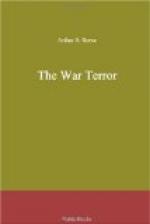Kennedy had meanwhile picked up one of the Corporation’s circulars lying on a desk. He ran his eye down the list of names.
“So, Hartley Haughton, the broker, is one of your stockholders,” mused Kennedy.
“Not only one but the one,” replied Denison with obvious pride.
Haughton was a young man who had come recently into his fortune, and, while no one believed it to be large, he had cut quite a figure in Wall Street.
“You know, I suppose,” added Denison, “that he is engaged to Felicie Woods, the daughter of Mrs. Courtney Woods?”
Kennedy did not, but said nothing.
“A most delightful little girl,” continued Denison thoughtfully. “I have known Mrs. Woods for some time. She wanted to invest, but I told her frankly that this is, after all, a speculation. We may not be able to swing so big a proposition, but, if not, no one can say we have taken a dollar of money from widows and orphans.”
“I should like to see the works,” nodded Kennedy approvingly.
“By all means.”
The plant was a row of long low buildings of brick on the outskirts of the city, once devoted to the making of vanadium steel. The ore, as Denison explained, was brought to Pittsburgh because he had found here already a factory which could readily be turned into a plant for the extraction of radium. Huge baths and vats and crucibles for the various acids and alkalis and other processes used in treating the ore stood at various points.
“This must be like extracting gold from sea water,” remarked Kennedy jocosely, impressed by the size of the plant as compared to the product.
“Except that after we get through we have something infinitely more precious than gold,” replied Denison, “something which warrants the trouble and outlay. Yes, the fact is that the percentage of radium in all such ores is even less than of gold in sea water.”
“Everything seems to be most carefully guarded,” remarked Kennedy as we concluded our tour of the well-appointed works.
He had gone over everything in silence, and now at last we had returned to the safe.
“Yes,” he repeated slowly, as if confirming his original impression, “such an amount of radium as was stolen wouldn’t occasion immediate discomfort to the thief, I suppose, but later no infernal machine could be more dangerous to him.”
I pictured to myself the series of fearful works of mischief and terror that might follow, a curse on the thief worse than that of the weirdest curses of the Orient, the danger to the innocent, and the fact that in the hands of a criminal it was an instrument for committing crimes that might defy detection.
“There is nothing more to do here now,” he concluded. “I can see nothing for the present except to go back to New York. The telltale burn may not be the only clue, but if the thief is going to profit by his spoils we shall hear about it best in New York or by cable from London, Paris, or some other European city.”




